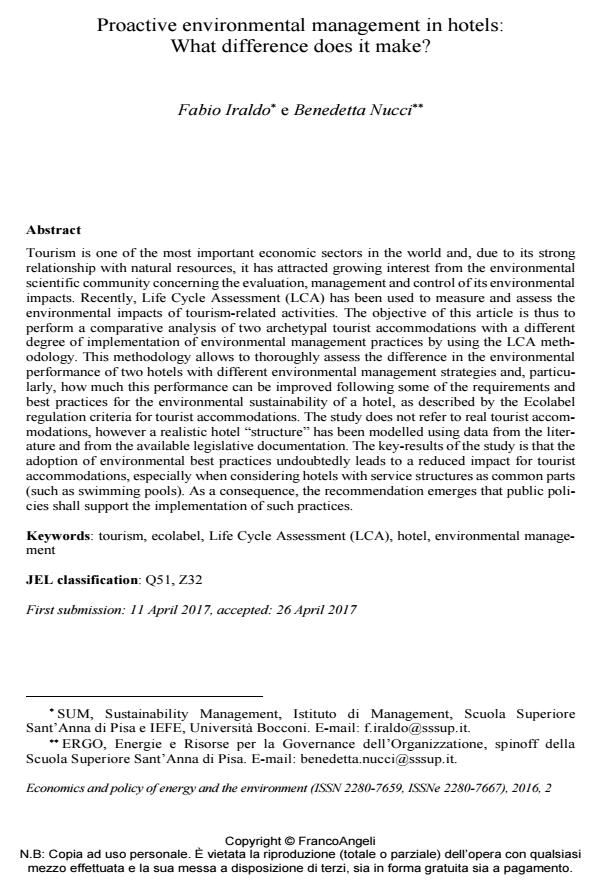Proactive environmental management in hotels: What difference does it make?
Titolo Rivista ECONOMICS AND POLICY OF ENERGY AND THE ENVIRONMENT
Autori/Curatori Fabio Iraldo, Benedetta Nucci
Anno di pubblicazione 2017 Fascicolo 2016/2
Lingua Inglese Numero pagine 26 P. 81-106 Dimensione file 2802 KB
DOI 10.3280/EFE2016-002005
Il DOI è il codice a barre della proprietà intellettuale: per saperne di più
clicca qui
Qui sotto puoi vedere in anteprima la prima pagina di questo articolo.
Se questo articolo ti interessa, lo puoi acquistare (e scaricare in formato pdf) seguendo le facili indicazioni per acquistare il download credit. Acquista Download Credits per scaricare questo Articolo in formato PDF

FrancoAngeli è membro della Publishers International Linking Association, Inc (PILA)associazione indipendente e non profit per facilitare (attraverso i servizi tecnologici implementati da CrossRef.org) l’accesso degli studiosi ai contenuti digitali nelle pubblicazioni professionali e scientifiche
Tourism is one of the most important economic sectors in the world and, due to its strong relationship with natural resources, it has attracted growing interest from the environmental scientific community concerning the evaluation, management and control of its environmental impacts. Recently, Life Cycle Assessment (LCA) has been used to measure and assess the environmental impacts of tourism-related activities. The objective of this article is thus to perform a comparative analysis of two archetypal tourist accommodations with a different degree of implementation of environmental management practices by using the LCA meth-odology. This methodology allows to thoroughly assess the difference in the environmental performance of two hotels with different environmental management strategies and, particu-larly, how much this performance can be improved following some of the requirements and best practices for the environmental sustainability of a hotel, as described by the Ecolabel regulation criteria for tourist accommodations. The study does not refer to real tourist ac-commodations, however a realistic hotel "structure" has been modelled using data from the literature and from the available legislative documentation. The key-results of the study is that the adoption of environmental best practices undoubtedly leads to a reduced impact for tourist accommodations, especially when considering hotels with service structures as common parts (such as swimming pools). As a consequence, the recommendation emerges that public policies shall support the implementation of such practices.
Parole chiave:Tourism, ecolabel, Life Cycle Assessment (LCA), hotel, environmental man-agement
Jel codes:Q51, Z32
- Sustainability and Environmental Impact of the Tourism Sector: Analysis Applied to Swimming Pools in the Hotel Industry on the Costa Brava Núria Arimany-Serrat, Juan-Jose Gomez-Guillen, in Environmental Processes 55/2023
DOI: 10.1007/s40710-023-00665-4 - Economic-Environmental Law Guarantee of the Green and Sustainable Development: Role of Health Expenditure and Innovation Lin Yang, in Frontiers in Public Health 910643/2022
DOI: 10.3389/fpubh.2022.910643 - Greener Future Enakshi Dutta, Tajinder Jassal, Vishal Soodan, Nitin Gupta, pp.155 (ISBN:978-1-83608-989-6)
Fabio Iraldo, Benedetta Nucci, Proactive environmental management in hotels: What difference does it make? in "ECONOMICS AND POLICY OF ENERGY AND THE ENVIRONMENT" 2/2016, pp 81-106, DOI: 10.3280/EFE2016-002005